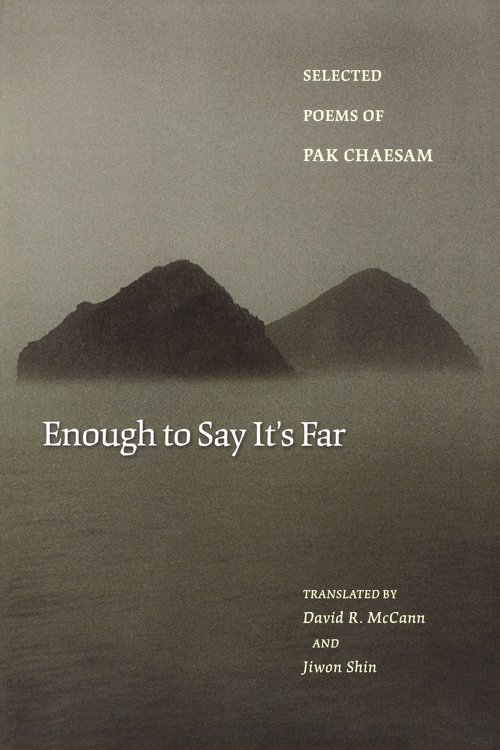-
 Korea.net's 24-hour YouTube channel
Korea.net's 24-hour YouTube channel- NEWS FOCUS
- ABOUT KOREA
- EVENTS
- RESOURCES
- GOVERNMENT
- ABOUT US
Han
Something like the persimmon tree?
Ripening in the sad evening glow,
The tree where the fruits of my heart’s love
Ripen.
With room to spread in the next world only,
Still it looms behind the one I was thinking of,
Falling down from above her head.
It may yet become the fruit
Of her overwhelming grief
That she wished to plant
In the yard of her house.
Or would she understand
If I said it was all my sorrow,
All my hope from a previous life,
The color of that fruit?
Or did that person too
Live in sorrow through this world?
That I do not know, I do not know.
From Pak Chae-sam’s 1960 collection of poems, “Chunhyang’s Mind”
Poet Pak Chae-sam (1933-1997) has been credited with putting a wide range of human emotions into his poems, using creative, succinct and emotional words.
His collection of poems, “Enough to Say It’s Far,” recently published in English, is the one collection of his that compiles into poetic words all the realizations and sympathy that one acquires throughout the many phases of life.

The collection consists of 59 works selected from among his lifelong body of work. His first collection, “Chunhyang’s Mind,” published in 1962, is a volume of poetry that sums up the sorrow, regret and resentment, also known as han, that storms through heartbroken couples.
The pieces in his second collection, “In the Sunshine,” published in 1970, depict compassionate feelings for life, describing the glorious and sorrowful experiences through which one lives.
“A Thousand Year-Old Wind,” his third collection, from 1975, personifies a wide range of emotions as images from nature, such as light, rivers and trees, all representing life and death.
Meanwhile, each poem from his fourth collection, “Autumn River in Burning Tears,” from 1991, sends a message that life is full of sorrow and grief. It epitomizes sadness and, at the same time, can give life lessons, allowing the reader to learn things important from all areas of life.
Born in 1933 in Tokyo, Pak Chae-sam graduated from Samcheonpo High School in 1953. The poet made his literary debut in 1955 with “Providence,” a traditional three-stanza sijo poem, and with “Stillness.”
He studied at Korea University, majoring in Korean language and literature, but poverty and illness cut his studies short in just three years. He spent his last years suffering from hypertension. However, he never put down his pen, continuing to write poems, until he died of the illness in 1997. Other works of his include “Next to Little Brats” (1976), “Under the Iron of the Moon” (1979) and “In Memories” (1983). He also published a collection of sijo in 1985, “My Love,” as well as six collections of essays throughout his life.
By Sohn JiAe
Korea.net Staff Writer
jiae5853@korea.kr
Something like the persimmon tree?
Ripening in the sad evening glow,
The tree where the fruits of my heart’s love
Ripen.
With room to spread in the next world only,
Still it looms behind the one I was thinking of,
Falling down from above her head.
It may yet become the fruit
Of her overwhelming grief
That she wished to plant
In the yard of her house.
Or would she understand
If I said it was all my sorrow,
All my hope from a previous life,
The color of that fruit?
Or did that person too
Live in sorrow through this world?
That I do not know, I do not know.
From Pak Chae-sam’s 1960 collection of poems, “Chunhyang’s Mind”
Poet Pak Chae-sam (1933-1997) has been credited with putting a wide range of human emotions into his poems, using creative, succinct and emotional words.
His collection of poems, “Enough to Say It’s Far,” recently published in English, is the one collection of his that compiles into poetic words all the realizations and sympathy that one acquires throughout the many phases of life.

Pak Chae-sam’s collection of poems “Enough to Say It’s Far” is now published in English.
The collection consists of 59 works selected from among his lifelong body of work. His first collection, “Chunhyang’s Mind,” published in 1962, is a volume of poetry that sums up the sorrow, regret and resentment, also known as han, that storms through heartbroken couples.
The pieces in his second collection, “In the Sunshine,” published in 1970, depict compassionate feelings for life, describing the glorious and sorrowful experiences through which one lives.
“A Thousand Year-Old Wind,” his third collection, from 1975, personifies a wide range of emotions as images from nature, such as light, rivers and trees, all representing life and death.
Meanwhile, each poem from his fourth collection, “Autumn River in Burning Tears,” from 1991, sends a message that life is full of sorrow and grief. It epitomizes sadness and, at the same time, can give life lessons, allowing the reader to learn things important from all areas of life.
Born in 1933 in Tokyo, Pak Chae-sam graduated from Samcheonpo High School in 1953. The poet made his literary debut in 1955 with “Providence,” a traditional three-stanza sijo poem, and with “Stillness.”
He studied at Korea University, majoring in Korean language and literature, but poverty and illness cut his studies short in just three years. He spent his last years suffering from hypertension. However, he never put down his pen, continuing to write poems, until he died of the illness in 1997. Other works of his include “Next to Little Brats” (1976), “Under the Iron of the Moon” (1979) and “In Memories” (1983). He also published a collection of sijo in 1985, “My Love,” as well as six collections of essays throughout his life.
By Sohn JiAe
Korea.net Staff Writer
jiae5853@korea.kr
Most popular
- First hearing-impaired K-pop act hopes for 'barrier-free world'
- Expats could account for 7% of population in 20 years: report
- 'Mad Max' director impressed by 'cinema-literate' Korean viewers
- Show in Italy to present 'thought-filled' Korean craftworks
- Romanian presidential couple visits national cemetery













